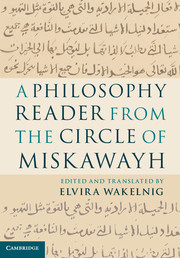Commentary
Published online by Cambridge University Press: 30 September 2021
Summary
5al (end of unidentified passage
Edition: ed. Cottrell with French tr. in ‘L’Anonyme’, pp. 435-6.
Source: unidentified; Ps.-Platonic?
As the beginning ofthe Marsh manuscript is lost, the text of our Philosophy Reader (PR) starts, mid-sentence, at the end of a discussion about how to talk about God appropriately. The topic is further elaborated in the following passages, which all sound Ps.-Platonic, but are introduced simply by ‘He says’. This seems to allow for the assumption that the incompletely preserved first quotation must also derive from some (Ps.-)Platonic source.
5a2-13 He says in his Letter ٤٠ Dionysius
Edition: ed. Cottrell with French tr. in ‘L’Anonyme’, pp. 435-6.
Source: unidentified; Arabic version of a commentary on the Ps.-Platonic Letter to Dionysius?
Parallel (partial): R. ft l-Raddy Istanbul, Üniversite Kütüphanesi, MS 1458, fol. 18; ed. Türker in ‘Traité’, 61.6-12; ed. Cottrell with French tr. in ‘L’Anonyme’, pp.435-6.
This is one of the rare instances in which the compiler of the PR provides his readers with the - although corrupted - title of the source he quotes. However, the provision of this title is not particularly helpful, even if Cottrell convincingly argues that the addressee of the letter must be Dionysius and the reference thus to the Ps.-Platonic Second Letter. The Greek version, Epistolae 310b-315a, has no parallel to the topics of our passage. Proclus’ discussion of the letter in his Theologia Platonica II, chapters 8 and 9, touches, at least, on the inconceivability and inexpressibility ofthe One and stresses that the soul must leave all multiplicity aside in order to join It. The similarities are not strong enough to assume that this Proclean passage is a likely source for the quotation in the PR, but they suggest that our compiler draws on a commentary ofthe letter rather than the letter itself.
So far, no Arabic version of or commentary on a Letter to Dionysius has been discovered, but that it must have existed is suggested by another excerpt ascribed to it in the Ps.-Platonic R. fi l-Radd. The entire excerpt is, as Cottrell shows, parallel to the quotation in the PR, yet the latter is slightly longer.
- Type
- Chapter
- Information
- A Philosophy Reader from the Circle of MiskawayhText, Translation and Commentary, pp. 341 - 480Publisher: Cambridge University PressPrint publication year: 2014

